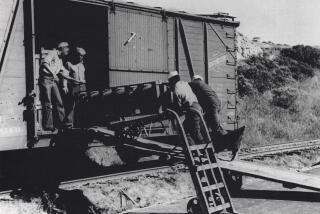Judge Tosses Out Drug Case Against Captain of Ship
- Share via
After more than a year behind bars, a Nicaraguan ship captain and an Ecuadorean crewman were released Friday from U.S. custody after a San Diego federal judge dismissed charges of possessing about 15 tons of cocaine at sea.
U.S. District Judge Rudi M. Brewster said federal agents violated a legal duty to preserve any evidence that not only would have tended to convict but also might have exonerated captain Horacio Velarde-Gavarrete, 48, and crewman Bolivar Wilson Guerrero-Mosqueda, 43.
U.S. Coast Guard and other federal agents failed to keep notes or other records of interviews of other crewmen aboard the merchant ship Nordcapp that might have exonerated the two, Brewster ruled. The ship sank Sept. 11, 1990, on the high seas, about 400 miles south of Acapulco.
Hours after both men walked out of the federal Metropolitan Correctional Center in downtown San Diego, Steven Riggs, a deputy federal public defender who represented Velarde, said he was thrilled.
“The government took every possible measure to preserve any potential helpful evidence to prosecution and did not lift a finger to help Mr. Velarde or Mr. Guerrero,” Riggs said.
Assistant U.S. Atty. Bruce Smith, the prosecutor in the case, said the government is considering an appeal of Brewster’s ruling. Smith declined further comment.
According to an indictment issued Nov. 9, 1990, both Velarde and Guerrero were charged with possessing $273 million worth of cocaine on a ship with intent to distribute. If convicted, both could have been sentenced to life in prison without parole, prosecutors said.
The indictment said that a Coast Guard crew aboard the U.S. Navy cruiser Arkansas requested--and was granted--permission to come aboard the Honduran-flagged Nordcapp. When they boarded, Velarde told them the ship was on fire.
Shortly after rescuing all members of the Nordcapp crew, the ship sank, the indictment said.
Later, according to the indictment, U.S. agents learned that the ship was scuttled to hide 13,636 kilograms, about 15 tons, of Colombian cocaine. But they never actually found the cocaine.
But Riggs said defense investigation indicated that there had been an explosion that ignited an uncontrollable fire in the engine room.
The indictment alleged that the cocaine was to have been loaded into smaller boats and smuggled into the United States. The case was filed in San Diego because it was the closest American port, the lawyers said.
U.S. agents brought ship’s crewmen to San Diego on Sept. 15, 1990, four days after the ship sank, and held them briefly as witnesses, Riggs said. Those sailors explained about the fire, but U.S. agents did not take notes detailing an innocent explanation for the blaze, though they took detailed notes of Coast Guard interviews, Riggs said.
A few days afterward, the crewmen were deported to their homes in Panama, Colombia, Ecuador and Peru, Riggs said.
By not recording the material that might have proved Velarde and Guerrero innocent, the government failed to abide by a 1982 U.S. Supreme Court ruling that calls on federal agents to preserve potentially favorable defense testimony, Brewster ruled.
“You can’t just charge someone and deport all the evidence,” Riggs said.
More to Read
Sign up for Essential California
The most important California stories and recommendations in your inbox every morning.
You may occasionally receive promotional content from the Los Angeles Times.













